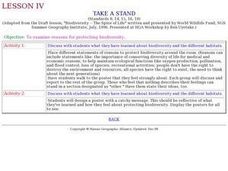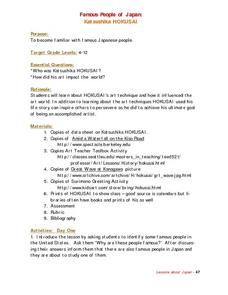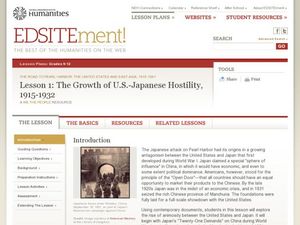Curated OER
Dragons Of China And Japan
Middle schoolers create drawings of dragons that could be found in the art of Japan or China. The lesson involves two-days of instruction and leads to student examples of dragons four-times larger than the originals.
Curated OER
Houses in Japan
First graders compare the everday lives of school-aged children in the United States and Japan by comparing the houses they live in. They discuss how traditional Japanese houses are designed with a feeling of opennes to the outdoors and...
Curated OER
Civics and Economics: The Occupation of Japan
Students compare the American political and economic systems to the Japanese systems. They interpret maps, tables, charts and political cartoons in analyzing the economic and political issues involved.
Curated OER
Would You Like to Attend School in Japan?
Sixth graders construct pro and con T-charts about their education system and that of Japan. They choose which system they prefer and give five reasons for it. Their reasons must be based on strong arguments and evidence.
Curated OER
Asian Studies Unit Korea
Students conduct research about different Asian countries. The research is done in order to compare and contrast the different land areas and cultures. Students complete a writing assessment related to it.
Curated OER
Say Hi to Haibun Fun
What is a haibun? With this interesting lesson, writers will experience the Japanese writing form haibun, identify elements important to Japanese writing styles, analyze a haibun, and compose their own. Different from the typical journal...
Curated OER
Katsushika HOKUSAI
Students identify some famous people in the United States and why these people are famous. Students identify and discuss famous people in Japan. Students use internet websites in bibliography if computer is available to learn more about...
Curated OER
The Growth of U.S.-Japanese Hostility, 1915-1932
Young scholars explore the relationship between Japan and the United States between 1915 and 1932. In this diplomacy instructional activity, students examine the Open Door Policy, 21 Demands, and the invasion of Manchuria by Japan. Young...
Curated OER
United States-Japanese Relations in Post World War II Era
Ninth graders analyze political cartoons and posters relating to the United States and Japan in the period following World War II. They discuss the positive and negative consequences of the United States occupation of Japan.
Curated OER
Japanese New Year
Students examine the celebrations around the Japanese New Year. After watching a video, they discuss and answer the questions given to them on a worksheet. As a class, they practice pronouncing common sayings in Japanese and create an...
Curated OER
Comparing the Similarities and Differences of Medieval Castles
Students compare and contrast a Japanese castle with a Welsh castle. In groups, pupils use the internet to research specified topics on a castle. They explore the government, construction and military function of the area. Classmates...
Curated OER
Japanese Bookbinding Kit
Students are introduced to Japanese bookbinding techniques. In groups, they compare and contrast the western style against the Japanese style. As a class, they make their own book binding to present the material in a more interesting way.
Curated OER
Making A Karuta Game
Students explore the culture of Japan be creating a traditional Japanese game called Karuta. They conduct research in order to find the rules for the game and to make cultural connections. The content of the game is modified according to...
Curated OER
Attack on Hiroshima and Nagasaki
Sixth graders hear a story about the atomic bombing of Japan and write an editorial about the event from the perspective of either a Japanese or an American.
Curated OER
Moral and Ethical Beliefs: Proverbs
Students compare and contrast the cultures of Japan and the United States. In groups, they are given a proverb from each country and note the similiarties in their teachings. They complete a worksheet and share their findings with the...
Curated OER
Destiny Determined: Power & Ritual in Asia
Students brainstorm a list of symbols that represent our cultural values. They research symbols of China and Japan. Students create a timeline showing how symbols have evolved in these two countries. They view the video "Showing the...
Curated OER
East Asia: Population Facts and Figures
Students examine population information from East Asian countries. Using a specified website, pupils explore the population of China, Japan, North Korea and South Korea. Classmates examine the population density compared to the world's...
Curated OER
Pearl Harbor
Young scholars identify the location of Pearl Harbor and Hawaiian Islands on a map. In this map skills lesson, students use latitude and longitude coordinates to locate various places of importance of the Pearl Harbor attack.
Curated OER
Turning the Tide in Europe, 1942-1944
Students identify the reasons why the U.S. government decided to focus on the defeat of Germany and Japan and assess the wisdom of this decision. They analyze the magnitude of the U-Boat threat in the Atlantic.
Curated OER
Rice Farming History
Second graders map the progress of rice farming by using a map of the United States. In this rice farming lesson plan, 2nd graders draw a line on the map from where rice farming started to the progression of its growth.
Curated OER
The Golden Rule of Reciprocity
Students explore The Golden Rule of Reciprocity from various religions. In this religious beliefs lesson, students examine various religious quotes and summarize the idea of The Golden Rule in a sentence.
Curated OER
Political Legends and Map Symbols
Students identify the legend and map symbols. In this map skills lesson, students use a world map to find various locations using a map key.
Curated OER
Japanese Noh Masks
Eighth graders create Noh masks. For this Japanese art lesson, 8th graders research Noh masks and their special connection to Chinese theater, and then make their own.
Curated OER
Japanese Manners and Life Style
Students continue their examination of modern Japan and its culture. Using a map, they locate various cities and landforms in the country and watch a video on related topics in which the make a timeline of key events. In groups, they...

























